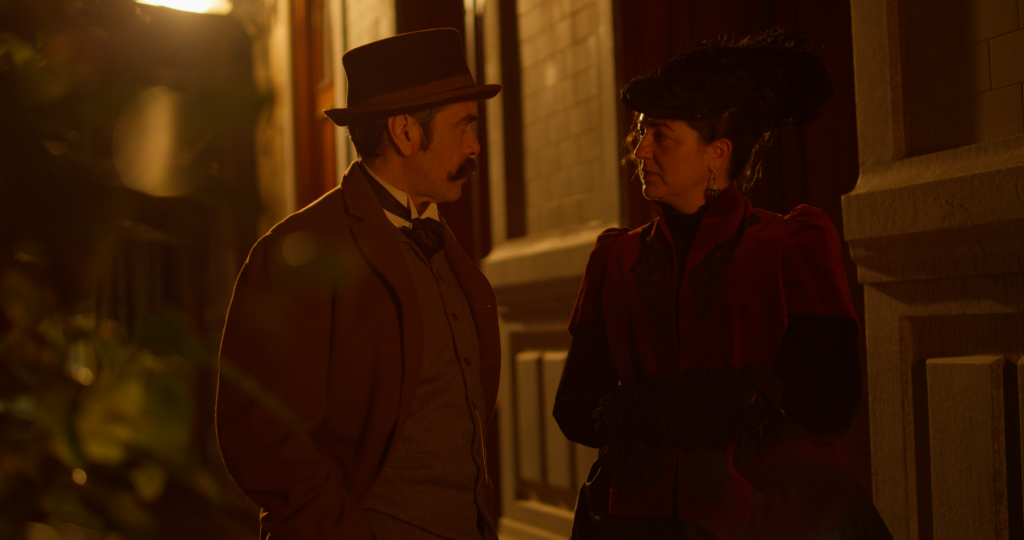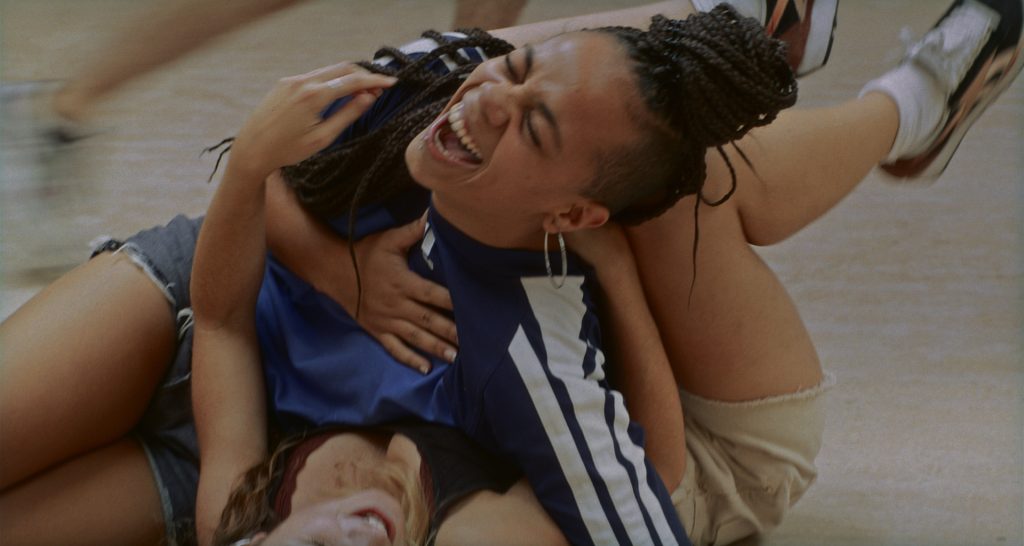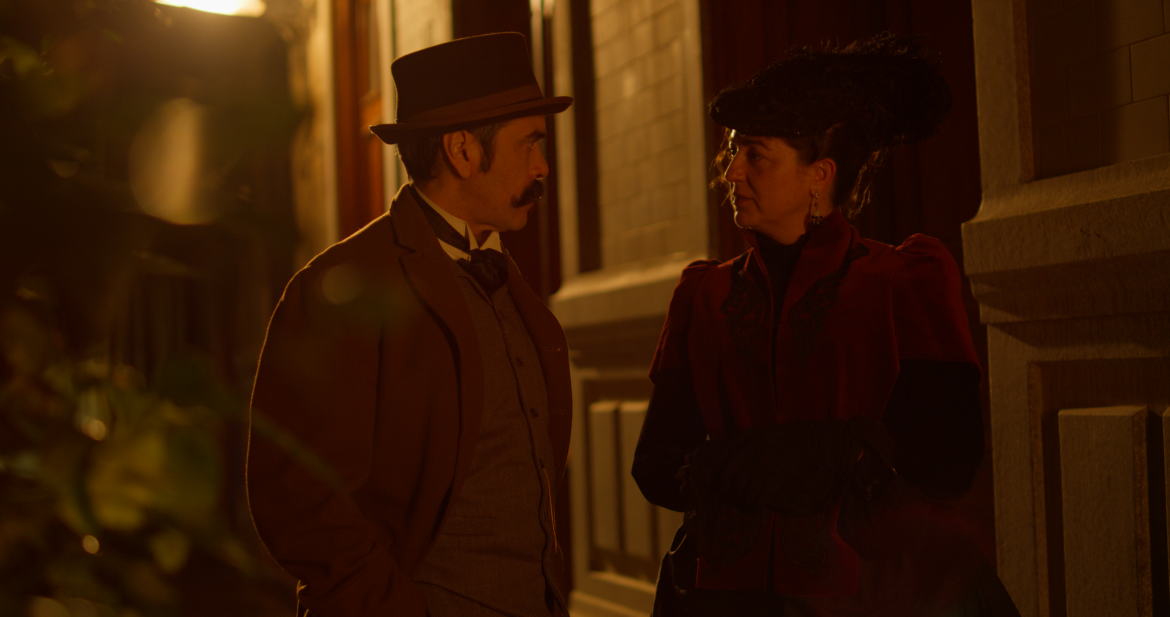• For the Canarias Cinema section’s closing, Mi ilustrísimo amigo, by Paula Cons, rediscovers Galdós’ side as a lover on the same day that actress Sara Toledo presents Adrián Orr’s film A nuestros amigos
Las Palmas de Gran Canaria, Thursday, April 24, 2025.- Rediscovering Galdós from Las Palmas de Gran Canaria: as a man and a lover. That’s what Paula Cons’ Mi ilustrísimo amigo makes possible within the Canarias Cinema section of the Las Palmas de Gran Canaria International Film Festival. The love story between Don Benito and Emilia Pardo Bazán has been turned into a movie, because it was like that, a movie-like passionate and epistolary relationship between an improbable couple. Also competing for the Richard Leacock Award is the film A nuestros amigos, by Adrián Orr, a filmmaker, screenwriter and cinematographer who approaches from a special point of view the universal topic of coming of age in the hood. Both films will be shown on Sunday, April 27.
Mi ilustrísimo amigo / My Dearest Friend (2024, Spain, 84 min.) will be screened at 10 a.m. at Cine Yelmo Las Arenas Screen 6 and at 6 p.m. at the same screen. Its last showing is scheduled for Wednesday, April 30, at 8 p.m. at Screen 7.
A nuestros amigos / To Our Friends (2024, Spain-Portugal, 90 min.) will be screened at 12:15 p.m. at Cine Yelmo Las Arenas Screen 6 and at 8:15 p.m., when its lead actress, Sara Toledo, will be in attendance. Its last showing will take place at noon on Friday, May 1, at Screen 7.
Mi ilustrísimo amigo / My Dearest Friend

Mi ilustrísimo amigo explores the love story between Emilia Pardo Bazán and Benito Pérez Galdós. Ahead of its time in many respects, their romance provides lots of on-screen possibilities, besides the huge challenge it meant for its lead actors, Paco Déniz and Lucía Veiga. The film was promoted by Canarian producer Chedey Reyes, who trusted its direction to Galician filmmaker Paula Pons, who assumed the task with the passion befitting a project of this nature.
The Canarian-Galician pair is transferred here from the story’s development to its filmmaking. Cons points out that “when approaching a period film, you always try to bring it to the present time. But we had to make no effort here, because Galdós and Pardo Bazán seemed to me so contemporary, and can teach us so many things about personal relationships, about sex, even.”
The filmmaker is happy about having worked alongside art director Vanesa Tellez, costume designer Fede Poluso and Canarian cinematographer Tere Ruano, besides Reyes himself. “We talked a lot among us, we played a lot with colors and the different elements. We established plenty of dialogue and communication among us, and that was crucial.”
Cons refers to her Don Benito, Paco Déniz, as “the expert on Galdós, the worker. He shows a dedication that wins you over. He trusted me and jumped without a net.” She also describes her lead actress, Lucía Veiga, as “a stage animal.” They both elevate the story, not only with their work, but with their on-screen chemistry. The filmmaker claims that, from the beginning, “it was amazing. From the very first day. You make a text practice walking down the street and you say ‘Wow.’ And in the second try it’s like ‘Oh my god, they are more than ready to film!’”
The actual filming took only one week of shooting in Madrid and three other in Gran Canaria. Discovering the Galdosian locations in the Gran-Canarian capital was a huge revelation for Cons. “When I arrived, I was amazed by those buildings. Architecturally, it was wonderful.”
The Galician director, who has made other historical films such as Lobos sucios (2015) or La isla de las mentiras (2025), in addition to the tv series ¿Dónde está Marta? (2021), claims that Don Benito is owned “a debt by all of Spain, not just cinema. It’d be a lot better for us if we all read his National Episodes. Forty years of dictatorship contributed a lot to Galdós’ fall into oblivion. And also to Emilia, although in a way she was more conservative in her views. She has been, too,” she continues, “unjustly treated by history. It’s been said that anybody could be a feminist with the position she was in. But there were a lot of them there and none did anything. She invented a term like ‘womancide’ and left her mark.”
Even so, in the film “we wanted to focus on the person. There’s a point at which you have to be bold. If you stop to thinks about who you are trying to portray, you become paralyzed. And here they are in the open, people of flesh and blood, making big mistakes and loving each other. Doing the best they can.” For Cons, Benito and Emilia “are humanized. And he is a victim of their time. Yet, despite all that, he’s the best man he can possibly be at that moment. In the face of certain issues the film deals with, they both were victims of the patriarchy and of a society in which, actually, we couldn’t ask them for more.”
According to Cons, both characters “cannot be regarded from our current point of view. Maybe Galdós wasn’t fair with Emilia, but he realizes it, and that’s a lot. He hurts himself. Here, he is a man who shows his emotions and asks for forgiveness. I find it to be a wonderful masculinity.”
The director admits that “as a documentary filmmaker, journalist and director, I love true facts. Everybody thinks it was a project of my own, but it wasn’t: it was a job. From Chedey. And the shooting process has been even therapeutic for me.” Cons is happy about the selection of the feature at the Canarias Cinema section of the Gran-Canarian Festival. “It’s pretty nice that a film about Galdós ends up here, it’s like coming full circle,” she points out, before concluding that “I think the relationship between the city and the festival is beautiful. A very interesting film festival for independent cinema.”
A nuestros amigos / To Our Friends

Adrián Orr has directed A nuestros amigos, a piece on the edge of the documentary genre, in which the filmmaker has thrived with titles such as Buenos días resistencia (2013) and Niñato (2017). The director from Madrid, trained at Lisbon, offers here the final result of Sara Toledo’s life tracking, filmed mostly in Madrid, in the hood. Her adolescence and her coming of age become the frame of a piece endowed with the full power of attraction of the real, the authentic.
“This was very, very long, four years of shooting,” Toledo recalls. He will be at the Gran-Canarian event to present his feature. “I’ve been told it’s an amazing festival and that I’m going to love it,” he anticipates.
“Adrián was finding the movie after the first summer, then the intensity has been slowly decreasing,” the lead actress explains regarding the preparation of a piece she describes as “a documentary hybrid, between what was happening to me and what Adri was seen.” The actress insists on the fact the it ends up being captured on screen “the feeling of growing during the film, there’s a lot of it. I myself has gotten a lot closer to cinema, in fact, that’s what I work in right now.”
When the shooting started, Sara was 18 years old, “I didn’t know anything.” Today she is an actress who sometimes struggles with “looking at yourself in those years that were yours. It depends on the day it gets you, it cheers you up or gets you down in the dumps, because you’re in a slump and don’t like yourself. But it’s been a fun and easy process in general, because Adrián and I are very good friends. And there’s always been a lot of freedom, in terms of what we wanted to do and what we didn’t. We also had the peace of mind of knowing we had enough time to do it.”
Now Toledo can say that “it’s been great, because this film has been ours.” Although “I’m very surprised at the response it is getting” in the festival circuit. Orr’s film has received the Best Documentary Award at Nantes’ Festival du Cinéma Espagnol, and it’s also being recognized and applauded by critics.
As well as Toledo, who, nonetheless, points out that “I’ve been told a lot this thing about becoming the voice of a generation, and that I represent a lot of people of my age who needs to be seen.” Before this feature, she participated in the La Tristura’s play Future Lovers, in which six young people born around 2000 share among them and with the audience their perspectives of the world.
“I don’t think anybody can have that,” the actress claims, “it’s just that I feel there are a lot of things that are very specific and other ones that are universal. Of course, when Adri decides to put a spotlight on me, it shows a lot of things that are happening around me, but I don’t think the final intention is that, but instead approaching something more intimate and personal.” “In everything I’ve done,” she believes, “the audience is appealed from intimacy and day-to-day life. If I had to be proud, it’d be because of that. Not because I’d be given a voice to the rest of people, but because I’d appear as a reflection in which others could recognize themselves.”
Share this Post

